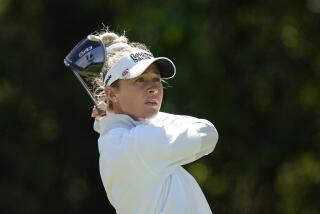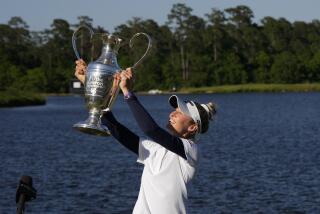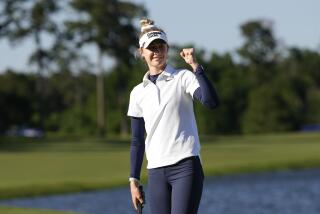Sampras Gets Early Czech Out
- Share via
NEW YORK — Just when Pete Sampras seemed to be propelled by the force of destiny, rushing him toward his place in tennis history, some ugly reality steps in.
The death of his beloved coach, his inability to win on clay, an impaired physical constitution--all these have felled Sampras, but seldom has he lost a match in a Grand Slam tournament to an opponent playing markedly better tennis than the world No. 1.
That scenario was added to Sampras’ chronicle of misfortunes in Monday’s fourth-round match at the U.S. Open. The defending champion was outplayed by 15th-seeded Petr Korda of the Czech Republic in a dazzling display of superb shotmaking.
The match could scarcely have been closer. Korda advanced to the quarterfinals, 6-7, (4-7), 7-5, 7-6 (7-2), 3-6, 7-6 (7-3). The playing time of the match--which included three rain delays--was 3 hours 37 minutes but it took more than five hours to complete.
The loss was tough for Sampras. It was winning this tournament last year that salvaged Sampras’ season and was his only Grand Slam title.
Monday’s loss halts his inexorable drive toward Roy Emerson’s record of 12 Grand Slam titles. He has won 10, having added the Australian Open and Wimbledon this year. For now, those titles will have to be enough.
“Hopefully, I can try to end the year as No. 1,” said a subdued Sampras. “I have no complaints about my year. As an athlete, you always want more. I definitely wanted this title. I’m going to wake up tomorrow and I’m going to be very disappointed.”
Sampras predicted the title would now be won by a fellow American, either No. 2 Michael Chang or unseeded Andre Agassi, both of whom play their fourth-round matches today.
Korda, 29, has always been known as a talented player, but groin surgery in 1995 and 1996 hindered his progress. Before that, Korda had been ranked as high as No. 4.
“I’m really proud of myself,” Korda said. “I feel I was climbing on my mountain. It was a very, very long journey. Three and a half or four years went through my mind.”
Korda was eliminated in the third round here last year and celebrated his victory Monday with what is now his trademark move--a leaping scissor kick.
Sampras warmed up with American Jeff Salzenstein to familiarize himself with a left-handed player. No one could have prepared Sampras for Korda’s devastating shotmaking skills. The Czech’s backhand was especially potent.
The match was played in the middle of the tournament’s hottest day. The 90% humidity changed inevitably into thundershowers and the early afternoon eroded into night. Fans swarming into the National Tennis Center for the night matches, scheduled to start at 7:30, were kept restlessly waiting outside the entrance to the Arthur Ashe Stadium.
Thousands of fans abandoned matches on the outer courts and gathered under huge electronic scoreboards to follow the match. Few were able to comprehend that Sampras was in as much distress as he was.
Sampras came into the match having not lost a set, as would be expected from his light schedule. He played two qualifiers. Korda is the first seeded player he faced. Sampras lacked the sharpness that such matches produce.
Rarely has the economical Sampras produced as many unforced errors. His 66 unforced errors would not be expected to keep him competitive against even a marginally good player, much less someone in Korda’s zone.
“He played some unbelievable tennis,” Sampras said. “It’s the best backhand I’ve ever seen. Because of his ability to hit a winner from anywhere on the court, when he gets hot, there’s nothing you can do.”
Sampras came into the match having faced only two break points in the tournament. A hint of the change in his fortunes came in the eight game of the first set when Sampras faced three break points.
He fended those off, then faced three set points against him in the 12th game. Sampras dispatched those with an ace and two service winners. That sent the set into a tiebreak, which Sampras won.
Sampras appeared to grow more comfortable and assured in the second set. Korda gave the impression of allowing himself to grow irritated by what he perceived as incorrect line calls. Yet, that was misleading. In contesting the calls, Korda was fueling his competitive fire.
Sampras broke in the second game of the set but Korda broke back in the fifth. During that changeover, a light rain began to fall. The delay lasted 10 minutes and the players never left the court.
Sampras’ serve continued to bail him out . . . until the 12th game of the set. He double-faulted to set up triple set point for Korda. Korda broke on the next point when Sampras followed his serve to net and Korda flicked a backhand past him to take the second set.
It was the first set Sampras had lost during the tournament.
Sampras broke twice to take the fourth set.
Korda was the only player to take Sampras to a fifth set at Wimbledon, so the territory had already been covered. Both players agreed the turning point came in the fourth game, when a Sampras shot that appeared to be clearly in was called out on an overrule.
Korda broke in the next game and held to make it 3-3. The set remained on serve and drove into another tiebreaker, which Korda utterly dominated.
More to Read
Go beyond the scoreboard
Get the latest on L.A.'s teams in the daily Sports Report newsletter.
You may occasionally receive promotional content from the Los Angeles Times.











